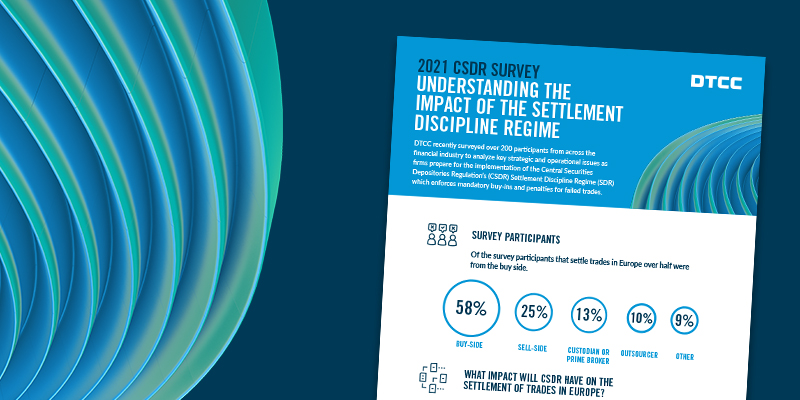DTCC recently surveyed more than 200 participants from across the financial industry to analyze key strategic and operational issues as firms prepare for the implementation of the Central Securities Depositories Regulation’s (CSDR) Settlement Discipline Regime (SDR), which enforces mandatory buy-ins and penalties for failed trades.

Read the full survey report: 2021 CSDR Survey: Understanding the Impact of SDR
Overall, the results from the survey are similar to what DTCC saw in the 2020 client impact survey. A year on, with a delay to implementation, clients continue to believe that CSDR is going to have a significant operational impact to their firms, yet they still have many unknowns to what the new processes will look like. With that, the best way to avoid penalties when it comes to SDR is to prevent fails from occurring in the first place. Eighteen percent of respondents indicated that incorrect or missing SSIs are one of the top reasons that their trades fail today and more than 80% are looking to implement new measures to reduce their fails – including 4 out of 10 looking for new solutions to their exception management.
DTCC’s Institutional Trade Processing provides an integrated suite of solutions to help support CSDR compliance, minimizing the risk of trade failure by ensuring that clean and accurate golden source data are used to create an authoritative trade record, automated processing and efficient exception management.
ALERT®, the industry’s largest SSI database, provides clients access to up-to-date SSI information, reducing the risk of failed trades due to inaccurate or incomplete instructions. Additionally, through ALERT Global Custodian Direct (GCD), SSIs stored in ALERT can be sent directly from and be maintained by source data providers such as global custodians, driving reliable source data. Nine major global custodians are currently live on ALERT GCD, covering 36% of the total SSIs in the database. DTCC is working with the industry to expand this coverage by onboarding additional large global custodians and developing tools to assist smaller global custodians that are not able to build directly to ALERT GCD.
DTCC’s CTMTM, the central matching platform for cross-border and domestic transactions, automates the trade confirmation process across multiple asset classes. When used in conjunction with ALERT, CTM enables clients to automatically enrich trades with SSIs, helping ensure all account information is accurate. Clients can also upgrade their ALERT enrichment capabilities by accessing our ALERT Key Auto Select (AKAS) functionality, a rules-based enrichment of CTM trades eliminating the need to provide ALERT Keys as part of the trade information.
DTCC Exception Manager helps clients quickly resolve exceptions and reduce delays in settlement with the ability to publish, manage and communicate about exceptions throughout the trade lifecycle, To further help clients, the CSDR add on module will be launched later this year to enable users to prioritize exceptions based on the size of predicted penalty prior to Settlement Date, to help manage activity and prevent a fail from occurring.
To learn more about how DTCC can help with CSDR visit https://www.dtcc.com/csdr